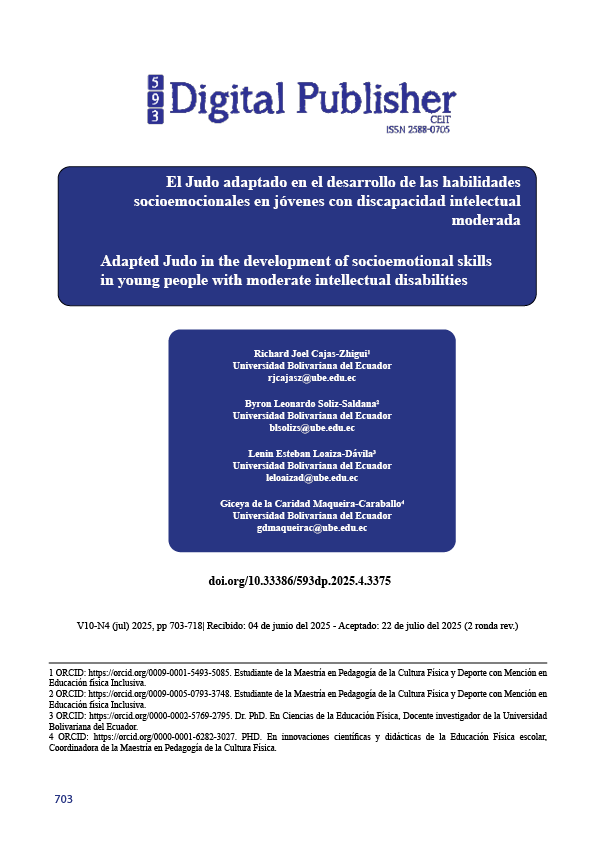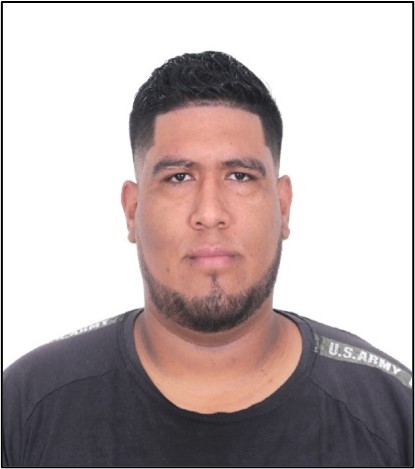Adapted Judo in the development of socioemotional skills in young people with moderate intellectual disabilities
Main Article Content
Abstract
This study analyzed the impact of an adapted judo program on the development of socioemotional skills in young individuals with moderate intellectual disabilities. A mixed-methods sequential design was employed, combining an initial quantitative phase using the D-ECREA instrument to assess emotional competencies, followed by a qualitative phase involving expert interviews to validate the pedagogical intervention. The sample consisted of 17 students, including one diagnosed with moderate intellectual disability. Quantitative results revealed that students without special educational needs scored highly in emotional self-awareness (M=2.69; SD=0.33), emotional regulation (M=2.72; SD=0.41), and creativity (M=2.67; SD=0.44), while the student with a disability obtained intermediate scores of 1.67, 2.00, and 2.00, respectively. The qualitative analysis supported the relevance and feasibility of the intervention, highlighting improvements in self-regulation, self-esteem, and social interaction for the student with a disability. Methodological triangulation enabled refinement of the pedagogical design, incorporating specific dynamics to foster inclusion, empathy, and cooperative learning. The findings suggest that adapted judo, when implemented in a structured and supportive educational environment, serves as an effective tool to enhance socioemotional competencies in inclusive school settings, achieving not only measurable improvements but also meaningful transformations in the educational experiences of students with disabilities.
Downloads
Article Details

This work is licensed under a Creative Commons Attribution-NonCommercial-ShareAlike 4.0 International License.
1. Derechos de autor
Las obras que se publican en 593 Digital Publisher CEIT están sujetas a los siguientes términos:
1.1. 593 Digital Publisher CEIT, conserva los derechos patrimoniales (copyright) de las obras publicadas, favorece y permite la reutilización de las mismas bajo la licencia Licencia Creative Commons 4.0 de Reconocimiento-NoComercial-CompartirIgual 4.0, por lo cual se pueden copiar, usar, difundir, transmitir y exponer públicamente, siempre que:
1.1.a. Se cite la autoría y fuente original de su publicación (revista, editorial, URL).
1.1.b. No se usen para fines comerciales u onerosos.
1.1.c. Se mencione la existencia y especificaciones de esta licencia de uso.
References
Campos, M., Rizzo, T., Oblak, V., Massart, A., & Descamps, G. (2024). Benefits of Judo Practice for Individuals with Neurodevelopmental Disorders: A Systematic Literature Review. Sports, 12. https://doi.org/10.3390/sports12070182.
Cecchini, J. A., Carriedo, A., Fernández-Río, J., Méndez-Giménez, A., González, C., Sánchez-Martínez, B., & Rodríguez-González, P. (2021). A longitudinal study on depressive symptoms and physical activity during the Spanish lockdown. International journal of clinical and health psychology: IJCHP, 21(1), 100200. https://doi.org/10.1016/j.ijchp.2020.09.001
Dakopolos, A., Condy, E., Smith, E., Harvey, D., Kaat, A., Coleman, J., Riley, K., Berry-Kravis, E., & Hessl, D. (2024). Developmental associations between cognition and adaptive behavior in intellectual and developmental disability. Journal of Neurodevelopmental Disorders, 16. https://doi.org/10.1186/s11689-024-09542-z.
Daros, A., Haefner, S., Asadi, S., Kazi, S., Rodak, T., & Quilty, L. (2021). A meta-analysis of emotional regulation outcomes in psychological interventions for youth with depression and anxiety. Nature human behaviour, 5, 1443 - 1457. https://doi.org/10.1038/s41562-021-01191-9.
Descamps, G., Massart, A., Rizzo, T., Pečnikar Oblak, V., & Campos, M. J. . (2024). Creencias y actitudes conductuales de los profesores de judo sobre la inclusión de participantes con trastornos del desarrollo intelectual: perspectivas de entrevistas cualitativas (Behavioral beliefs and attitudes of judo teachers regarding inclusion of participants with intellectual developmental disorders: insights from qualitative interviews). Retos, 59, 1103–1115. https://doi.org/10.47197/retos.v59.107380
Esper, T. (2022). Examining educational policies in Latin America: Comprehensive insights into contemporary reform. Compare: A Journal of Comparative and International Education, 53, 912 - 914. https://doi.org/10.1080/03057925.2022.2122225.
Feraco, T., Pellegrino, G., Casali, N., Carretti, B., & Meneghetti, C. (2025). Social, emotional, and behavioral skills in students with or without specific learning disabilities. Learning and Individual Differences. https://doi.org/10.1016/j.lindif.2024.102581.
Fullana, J., Pallisera, M., Vilà, M., Valls, M., & Díaz-Garolera, G. (2020). Intellectual disability and independent living: Professionals’ views via a Delphi study. Journal of Intellectual Disabilities, 24, 433 - 447. https://doi.org/10.1177/1744629518824895.
Garbeloto, F., Miarka, B., Guimarães, E., Gomes, F. R. F., Tagusari, F. I., & Tani, G. (2023). A New Developmental Approach for Judo Focusing on Health, Physical, Motor, and Educational Attributes. International Journal of Environmental Research and Public Health, 20(3), 2260. https://doi.org/10.3390/ijerph20032260
García, J. C., Díez, E., Wojcik, D. Z., & Santamaría, M. (2020). Communication Support Needs in Adults with Intellectual Disabilities and Its Relation to Quality of Life. International Journal of Environmental Research and Public Health, 17(20), 7370. https://doi.org/10.3390/ijerph17207370
García-Núñez, V., Curtó-Luque, C., Guerra-Balic, M., Martínez-Ferrer, J., Gómez-Hinojosa, A., & Morales-Aznar, J. (2020). An Adapted Judo Program Improves Psychosocial Behaviors In Children With Autistic Spectrum Disorders. Journal is not defined within the JOURNAL database. https://doi.org/10.1249/01.mss.0000676792.26925.51
Giné-Garriga, M., Roqué-Fíguls, M., Coll-Planas, L., Sitjà-Rabert, M., & Salvà, A. (2014). Physical exercise interventions for improving performance-based measures of physical function in community-dwelling, frail older adults: a systematic review and meta-analysis. Archives of physical medicine and rehabilitation, 95(4), 753–769.e3. https://doi.org/10.1016/j.apmr.2013.11.007
Gómez Pérez, M. (2021). Cautivos en la red. El impacto del metaverso en el derecho de acceso a la información y la protección de datos personales. IUS ET SCIENTIA, 7(2), 88–95. https://doi.org/10.12795/IETSCIENTIA.2021.i02.06
Hernández, S., Marín Quinto, S., Guillén Martín, V. M., & Mumbardó-Adam, C. (2025). Assessing Pragmatic Skills in People with Intellectual Disabilities. Behavioral Sciences, 15(3), 281. https://doi.org/10.3390/bs15030281
Hernández-Jorge, C. M., Rodríguez-Hernández, A. F., Kostiv, O., Domínguez-Medina, R., Hess-Medler, S., Capote, M. C., Gil-Frías, P. y Rivero, F. (2022). La Escala de Evaluación de las Competencias Emocionales: la Perspectiva Docente (D-ECREA). Psicología Educativa, 28(1), 61 - 69. https://doi.org/10.5093/psed2021a5
Hernández Lara, M., Martínez-García, A. I., & Caro, K. (2021). Interactive technology to support therapeutic interventions for emotional regulation of people with intellectual disabilities. Avances En Interacción Humano-Computadora, 6(1), 87–90. https://doi.org/10.47756/aihc.y6i1.96
Lane, R. D., & Smith, R. (2021). Levels of Emotional Awareness: Theory and Measurement of a Socio-Emotional Skill. Journal of Intelligence, 9(3), 42. https://doi.org/10.3390/jintelligence9030042
Lindell-Postigo, D., Zurita-Ortega, F., Melguizo-Ibáñez, E., González-Valero, G., Ortiz-Franco, M., & Ubago-Jiménez, J. (2023). Effectiveness of a Judo Intervention Programme on the Psychosocial Area in Secondary School Education Students. Sports, 11. https://doi.org/10.3390/sports11080140.
Marin, A., & Bocioacă, L. (2023). Study on the impact of adapted judo practice on individuals with ASD and Down syndrome. Discobolul – Physical Education, Sport and Kinetotherapy Journal. https://doi.org/10.35189/dpeskj.2023.62.2.4.
Moriña, A., Carballo, R., & Doménech, A. (2025). Transforming higher education: a systematic review of faculty training in UDL and its benefits. Teaching in Higher Education, 1–18. https://doi.org/10.1080/13562517.2025.2465994
Morales, J., Pierantozzi, E., Fukuda, D., Garcia, V., Guerra-Balic, M., Sevilla-Sánchez, M., & Carballeira, E. (2022). Improving motor skills and psychosocial behaviors in children with autism spectrum disorder through an adapted judo program. Frontiers in Psychology, 13. https://doi.org/10.3389/fpsyg.2022.1067310.
Nieto López, L., Garcia Canto, E., & Rosa Guillamón, A. (2020). Valores de Condición Física relacionada con la Salud en adolescentes de 14 a 17 años; relación con el estado de peso (Values of Health-related Physical Fitness in adolescents from 14 to 17 years of age; relationship with the weight status). Retos, 37, 215–221. https://doi.org/10.47197/retos.v37i37.69532
Pierantozzi, E., Morales, J., Fukuda, D., Garcia, V., Gómez, A., Guerra-Balic, M., & Carballeira, E. (2022). Effects of a Long-Term Adapted Judo Program on the Health-Related Physical Fitness of Children with ASD. International Journal of Environmental Research and Public Health, 19. https://doi.org/10.3390/ijerph192416731.
Pierantozzi, E., Sevilla-Sánchez, M., Garcia, V., Carballeira, E., Morales, J., Fukuda, D., & Guerra-Balic, M. (2022). Improving motor skills and psychosocial behaviors in children with autism spectrum disorder through an adapted judo program. Frontiers in Psychology, 13. https://doi.org/10.3389/fpsyg.2022.1067310.
Portela-Pino, I., Alvariñas-Villaverde, M., & Pino-Juste, M. (2021). Socio-Emotional Skills in Adolescence. Influence of Personal and Extracurricular Variables. International Journal of Environmental Research and Public Health, 18(9), 4811. https://doi.org/10.3390/ijerph18094811
Rautio, D., Jassi, A., Krebs, G., Andrén, P., Monzani, B., Gumpert, M., Lewis, A., Peile, L., Sevilla-Cermeño, L., Jansson-Fröjmark, M., Lundgren, T., Hillborg, M., Silverberg-Morse, M., Clark, B., Fernández de la Cruz, L., & Mataix-Cols, D. (2022). Clinical characteristics of 172 children and adolescents with body dysmorphic disorder. European child & adolescent psychiatry, 31(1), 133–144. https://doi.org/10.1007/s00787-020-01677-3
Rivera, P., Renziehausen, J., & Garcia, J. (2020). Effects of an 8-Week Judo Program on Behaviors in Children with Autism Spectrum Disorder: A Mixed-Methods Approach. Child Psychiatry & Human Development, 1-8. https://doi.org/10.1007/s10578-020-00994-7.
Román Medina, G. (2022). Inquietudes tardías, aprendizajes ociosos: Breath, Eyes, Memory, de Danticat, y L’Exil selon Julia, de Pineau. Romance Quarterly, 71(3), 224–241. https://doi.org/10.1080/08831157.2022.2124569
Sbriccoli, P., Cioni, L., Manno, R., Magnanini, A., Morales, J., Maussier, N., & Pierantozzi, E. (2024). Report on the 1st conference on adapted judo. Beyond the limits: exploring adapted judo. Revista de Artes Marciales Asiáticas. 19(1), 74-78. https://doi.org/10.18002/rama.v19i1.2407.
Pečnikar Oblak, V., Karpljuk, D., Šimenko, J., & Vodičar, J. (2020). Inclusion of people with intellectual disabilities in judo: a systematic review of literature. ARCH BUDO, 16, 245-260
Takahashi, N., Ogita, N., Takahashi, T., Taniguchi, S., Tanaka, M., Seki, M., & Umeda, M. (2019). A regulatory module controlling stress-induced cell cycle arrest in Arabidopsis. eLife, 8, e43944. https://doi.org/10.7554/eLife.43944
Trujillo-Torres, JM, Aznar-Díaz, I., Cáceres-Reche, MP, Mentado-Labao, T., & Barrera-Corominas, A. (2023). Aprendizaje intergeneracional y su impacto en la mejora de los procesos educativos. Ciencias de la Educación, 13 (10), 1019. https://doi.org/10.3390/educsci13101019





